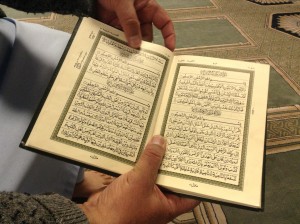
Islam is one of the world’s four largest religions with 1.5 billion members and is growing quickly, but is often misunderstood.
In his Education Week class, Jared Ludlow gave an introduction to the religion and clarified misconceptions. Ludlow also spoke of similarities between Islam and The Church of Jesus Christ of Latter-day Saints.
First, Ludlow addressed why Islam is in the news so much. Some reasons he provided include that there is no centralized hierarchy, there is no separation of church and state and there is a strict interpretation of Islamic law that is against modern society.
Ludlow also said that Muslims make efforts to reclaim past glory. In centuries past, the Middle East was an affluent and contributing part of the global society. This is in stark contrast to most perceptions of the Middle East today, Ludlow said.
“If they didn’t have oil today, most of the world wouldn’t give them a second thought,” Ludlow said.
While most people believe the Middle East to be where most Muslims are, Ludlow said, this is not the case. Indonesia has the highest percentage of Muslims, followed by Pakistan and India. The first Middle Eastern country on the list is Egypt and ranks fifth.
Ludlow explained key Islamic words and their significance. Islam literally means submission, and Muslim means one who has submitted. Ludlow said to be careful and know that the two are not interchangeable. Islam is the religion, and a Muslim is a member of the religion.
Allah means God. To demonstrate this, Ludlow said that when the sacrament prayers are said in Arabic, the world Allah is used.
Ludlow covered the the five pillars of Islam which are shahada (proclamation of faith), salat (prayer five times a day), sawm (fasting), zakat (almsgiving) and hajj (pilgramage to Mecca). Jihad has become a sort of unofficial pillar of Islam, Ludlow said.
Primarily, jihad the fight against sin and evil; however, extremists now push the secondary meaning of defending the faith against unbelievers.
Ludlow pointed out that Christianity and the Bible teach these concepts as well.
“We also are against the same things,” Ludlow said. “We’re against prostitution and drinking alcohol, but we don’t have the power to punish people if they do it. We don’t put them in prison or anything.”
Though the status of women in Islamic culture is not very high in many places today, this was not always the case. During the prophet Muhammad’s time, women’s status was actually better than it had ever previously been, Ludlow said. Additionally, Ludlow pointed out that what is seen is the news is not necessarily an accurate description of all Islamic areas or of all Muslims.
Ludlow emphasized a greater understanding of Islam by starting to understand fundamental, basic aspects of the religion. Just as Mormonism has been misunderstood and hopes to not be judged inappropriately, Islam wishes the same.




